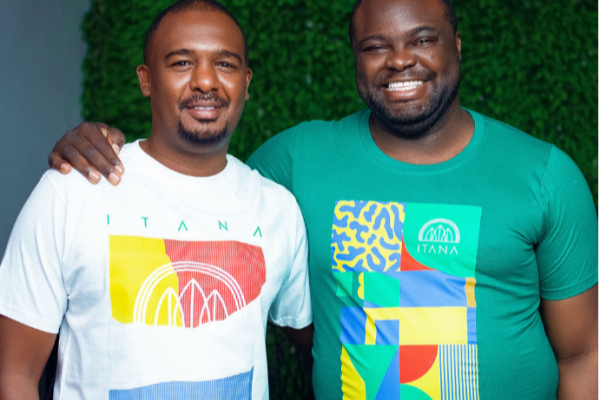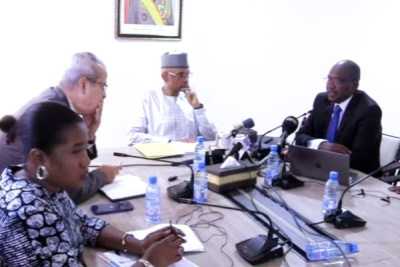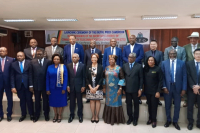Last Wednesday, Nigerian digital free-zone builder Itana announced it secured $2 million in a pre-seed round led by global venture capitalists LocalGlobe, Amplo, Pronomos Capital, and Future Africa.
The proceeds will support Itana’s efforts to improve the business environment, encourage foreign direct investment, and boost employment in Nigeria.
Technopark is a key player in innovation in Morocco. It helps revitalize the country’s economic fabric and promote youth entrepreneurship.
Launched in 2001 in Casablanca, Technopark is the first technology business incubator to be established in Morocco. It was established by MITC (Moroccan Information Technopark Company), a B2B service company, as a public partnership between the Moroccan Ministry of Industry, the World Bank, the national deposit and consignment fund CDG, Banque Centrale Populaire (BCP), and the now dissolved private equity firm ONA.
Technopark's mission is to facilitate the creation and growth of innovative companies operating in the fields of information and communication technologies (ICT), green technologies (greentech), and the cultural industry. It offers an environment conducive to the growth of start-ups, with a wide range of services including accommodation, mentoring, training, access to financing, market access, visibility, and networking.
Since its creation, Technopark has supported over 3,500 innovative companies, creating more than 15,000 direct and indirect jobs. It currently operates on five sites - located in Casablanca, Rabat, Tangier, Souss-Massa, and Agadir - hosting over 450 companies and regularly serving as a venue for events focused on innovation and entrepreneurship.
The incubator aims to be a strategic catalyst for Morocco's innovative entrepreneurial ecosystem, extending its model to other regions of the country. In the fourth quarter of 2023, Technopark Essouira will be inaugurated, and three other sites planned for Fez, Tiznit, and Oujda will launch in 2024. These new innovation centers will help support local start-ups and foster synergies between the various players in these regions.
Melchior Koba
The National Employers Council of Mali (Conseil national du patronat du Mali-CNPM) will organize the first edition of Salon international du développement accéléré du numérique (SIDAN) in Bamako next November 28-30.
The event, under the theme "Digital Sovereignty and Technological Progress: Vision and Strategies," aims to enable stakeholders in the tech industry to discuss digital issues and the contribution of the digital to the development of Mali.
The solution aims to help people build financial discipline.
Alvin App is a fintech solution developed by a Kenyan startup. It helps users efficiently manage, save, and grow their money.
"The only personal finance apps we could find in Kenya were not optimized for the local context, they offered no guidance to help us acquire the assets we wanted to save toward, and only offered the ability to save but gave no daily support to help us save for goals that require consistency for long periods.[...] Alvin is ultimately designed to be your daily pocket companion that makes it dead simple to feel like you’re in control of your financial situation, and that every day," explains Winston Reid, CEO of Alvin.
Through the Alvin Android app (only the Android app is available for the time being), users can create their accounts and set spending and saving goals to let the app track their budgets. Alvin defines daily, weekly, and monthly spending thresholds, enabling users to track the evolution of their savings.
In addition to setting up the budget, Alvin assists the user daily by sending budget alerts. It also carries out comparative analysis based on current and past spending. The analysis aims to help users build and stick to spending habits that facilitate the achievement of predefined saving goals.
"For anyone to build sustainable saving habits, they need to have sustainable spending habits. And doing this requires giving people more support than reminders to make deposits," says Winston Reid.
In 2022, the startup behind the app raised $740,000 to accelerate its growth. At the time, it indicated that the app was in its private beta phase, adding that it was planning to go international.
Adoni Conrad Quenum
Last September 5, Le Cercle Africain de Cybersécurité (CAC), a regional association aimed at enhancing cybersecurity in Africa, was launched in response to the new cyber threats facing the continent.
The CAC brings together cybersecurity/cyberdefense professionals, government representatives, cybersecurity business leaders, lawyers, and academics. It aims to encourage digital security initiatives, develop a cybersecurity culture and raise awareness on the threats that could impede countries’ economic growth.
With the acceleration of digital transformation across the continent, African countries are compelled to invest in cybersecurity. 18 of the continent's 54 countries have already drawn up national cybersecurity strategies, and 22 have national computer incident response teams (CIRTs).
The lack of investment and weak regulation exposes Africa to cyberattacks, according to the report "Cybersecurity in Africa- A Call to action" published in June 2023 by consulting firm Kearney. Yet investment in the African cybersecurity market is set to rise from $2.5 billion in 2020 to $3.7 billion in 2025, representing a compound annual growth rate of 7.9%.
"Despite this investment, it’s estimated the region loses more than $3.5 billion annually due to direct cyberattacks, and billions more from missed business opportunities caused by the resulting reputational damage from the attacks,” the report says.
To show the continent’s vulnerability to cyberattacks, Kearney tested its cyber resilience –the ability to resist, adapt, and recover from cyberattacks. That test focused on the five African best performers in the International Telecommunication Union's Global Cybersecurity Index: South Africa, Morocco, Nigeria, Kenya, and Egypt.
“Through the five selected countries, the analysis showed that Africa’s cyber resilience is low, particularly around strategy, governance and operational entities and cross-sector cooperation,” the report states.
While the average benchmark is 0.25% of GDP, South Africa, the African champion in cybersecurity spending, invests just 0.19% of its GDP, compared with 0.03% for the rest of sub-Saharan Africa. "If each African country spends 0.25 percent of GDP annually on cybersecurity, this would be in line with spending in mature markets. Our estimates suggest that this translates to $4.2 billion annually for the region," reads the document.
In addition to financial investment, investment in human capital is also an important component. Indeed, 84% of organizations believe that less than 50% of candidates applying for cybersecurity jobs are qualified, and more than half of companies seeking these profiles take more than 6 months to find qualified people.
Against this backdrop, in an interview with We Are Tech Africa last May, Youssef Mazouz, Secretary General of the African Cybersecurity Center, explained that there was a need to support Africa “by setting up continuous training, building skills, and opening cybersecurity research centers and universities."
Regulatory issues
African countries are yet to agree on regulations. Although the African Union convention on cybersecurity and the protection of personal data was adopted in 2014, it is not yet effective to this day. According to Article 36, to become effective, the convention must be ratified by at least 15 of the continent's 54 countries. To date, only 14 have ratified it, the latest being Côte d’Ivoire (March 2023). However, digital transformation has been accelerating on the continent since the Covid-19 pandemic.
“Cybersecurity is not a matter from which African countries can isolate themselves. The interconnectivity of systems results in the interconnectivity of the security threats to member states.[...] The absence of an implemented, unifying, regional governance framework makes it difficult to collaborate and share intelligence,” the report indicates.
Africa will better manage cybersecurity by emulating European countries, which opted for the General Data Protection Regulation (GDPR). That law, effective since May 2018, frames data processing equally throughout the European Union (EU).
Adoni Conrad Quenum
From November 15 to 17, 2023, Dakar, the capital of Senegal, will host the first edition of "This is Africa Digital," an event dedicated to the digitalization of Africa.
According to the organizers, the event will bring together key industry players to explore the opportunities offered by digitization in Africa.
In recent years, Kenya has established itself as a leader in digital transformation on the African continent, with one of the most dynamic ICT ecosystems in the world.
In the coming months, Kenya will establish a Centre of Excellence for digital skilling of the public workforce. Indeed, on September 4, 2023, ICT Minister Eliud Owalo (photo, center), met with a delegation from the United Nations Development Program (UNDP) and Microsoft Corporation. During the meeting, the three parties “deliberated on the development” of that center whose aim is to equip civil servants with the digital skills required to reinforce digitization.
The center aligns with one of the objectives of Kenya’s Digital Master Plan 2022-2032. It is announced three months after the signing of a partnership between the Kenyan government and the UNDP. The partnership focuses on key areas essential to driving an inclusive digital transformation, including training and skills enhancement, data governance, e-government, jobs, and digital businesses.
Once developed, the center will improve public workers’ ability to use digital technology for the delivery of public services. The aim is to accelerate the digital transformation of the economy and significantly reduce unemployment. According to Accenture's Africa iGDP Forecast, by 2025, Kenya's digital sector will add KES 1,400 billion ($9.5 billion) or 9.24% to the country's GDP.
Samira Njoya
She left the French pharmaceutical company Sanofi-Pasteur to fully devote herself to her passion: fashion. Her startup is now an industry leader in the Middle East and Africa, with a presence in Tunisia, Morocco, Algeria, and Egypt.
Ameni Mansouri (photo) is a young Tunisian entrepreneur better known as the co-founder and CEO of Dabchy, a fashion marketplace inspired by the European platform Vinted.
With a degree in biomedical engineering and biotherapy, she left her job at Sanofi-Pasteur to devote herself to promoting fashion and creating a community of fashion enthusiasts.
In 2016, she officialized Dabchy and, currently, the company boasts over a million users in the MENA region, offering the opportunity to sell and buy new and second-hand clothes at affordable prices, while being a sort of social network encouraging interaction between users. The platform generates revenue through commissions on transactions and offers secure delivery and payment services.
Ameni Mansouri wants to make her platform the leading reference for circular fashion in the Middle East and Africa, contributing to ecological transition in the textile industry. With that purpose in mind, in August 2023, Dabchy expanded operations into Egypt, consolidating its position as a major regional fashion player.
“This expansion fills us with pride, as it symbolizes Tunisia’s influence through its young and promising startup scene. We are determined to uphold the Tunisian values that have propelled us this far: innovation, creativity, and above all, trust in our community,” said Ameni Mansouri.
Over the course of her entrepreneurial career, the latter has won several awards. In 2018, she was selected among TechWomen and her start-up was recognized as one of Africa's top 100 at the Africa Forum.
In 2019, Dabchy became the first Arab and African company to be selected by Look Forward, a French incubator specializing in technological fashion. The same year, Ameni Mansouri was named one of Forbes' "30 under 30" in the Middle East.
Melchior Koba
Cameroon's Minister of Posts and Telecommunications, Minette Libom Li Likeng, recently announced the Cameroon Digital Week.
The event, to be held in Yaoundé from October 16 to 20, aims to highlight the country’s digital ambitions for its private and public sectors.
More...
Guinea intends to digitize its public administration, Minister of Posts, Telecommunications and Digital Economy, Ousmane Gaoual Diallo (photo, left), recently announced on social media.
According to the official, the government will invest $10 million to create a database and implement a Digital Territorial Development Plan, with the support of the United Nations Development Program (UNDP).
Over the years, she acquired extensive professional experience working for various marketing and consulting firms. She now heads her startup, which enables customers to conveniently save towards the purchase of expensive goods.
Juliet Shiro Njoroge (photo) is a Kenyan entrepreneur and experienced marketing professional. She graduated from the University of Nairobi with a Bachelor's of Law in 2016.
In 2021, she co-founded Mosmos, a goal-based savings-to-purchase platform that helps people in emerging markets buy expensive items without stressing over going into debt and even earning cash rewards for their purchase.
Through its platform, Mosmos enables its users to save to buy several items, from electronics and home appliances to decor supplies. With its flexible payment system, it allows its clients to avoid debts. It even rewards its most active and regular clients.
In March 2023, on the sidelines of International Women's Day, the company was selected to be part of the first cohort of the Google for Startups Accelerator: Women Founders (Africa). Five months later, in August, it was selected as one of 20 African startups to take part in the fourth edition of The Future is Female Mentoring program. In the same month, it raised $66,000 from Catalytic Africa.
Throughout her career, Juliet Shiro Njoroge has held several positions in many different fields. Brand Ambassador of the YUSUDI professional skills development training program, between 2015 and 2016, she worked for Trinc Media as an account manager. In 2017, she joined the Catapult Brand Consulting agency as a digital account manager. The following year, she was hired by Ogilvy, an advertising company, as an account manager.
In 2019, she became head of marketing and key accounts at Turaco, a micro-insurance tech company. A year later, she was appointed marketing and communications consultant at BFA Global, a consulting firm specializing in financial and digital innovation. Between 2021 and 2022, she successively held the positions of Marketing Manager and Head of Partnerships and Offline Growth at Koa Technology.
Melchior Koba
In various sectors, AI is constantly pushing the boundaries of knowledge. In Africa particularly, tech entrepreneurs are leveraging it to offer tailor-made and innovative solutions to identified challenges.
Baby Cry Insights is a mobile application developed by Nigerian start-up Ubenwa. It helps parents interpret their babies’ cries.
“Ubenwa is building a diagnostic tool that understands when a baby’s cry is a cry for medical attention. [...] Ultimately, our goal is to be a translator for baby cry sounds, providing a non-invasive way to monitor medical conditions everywhere you find a baby: delivery rooms, neonatal and pediatric intensive care units, nurseries, and in the home,” explains Charles Onu, CEO and co-founder of Ubenwa.
Baby Cry Insights is available for Android and iOS devices. Using any of those versions, a user can create a profile and record the cries of the baby to be monitored. The embedded AI-powered system then analyzes the cries to pinpoint the potential triggers identified. Whether it's fear, pain, discomfort, or hunger, the user will know the baby’s sentiment at that moment and act accordingly.
Baby Cry Insights sends a "report to better understand acoustic markers such as pitch frequency and intensity, and track which soothing technique worked best for your little one,” we learn.
The application also enables a user to share a baby’s profile with a second parent or nanny to make babysitting easier. With features like routine monitoring and health information, it facilitates the monitoring of babies’ daily routines such as sleeping, eating, breastfeeding, and any disturbances in their state of health. Users can thus anticipate medical assistance and better manage their baby's state of health.
Since its launch in 2017, the startup behind the solution has raised about $2.3 million to develop its technology and support growth. The Android version of its app has been downloaded more than a thousand times.
Adoni Conrad Quenum
The entrepreneurial landscape in Africa is thriving, offering startups opportunities for funding and increased visibility. Africa's Business Heroes plays a pivotal role in achieving this objective by identifying entrepreneurs and actively supporting their growth journey.
Kigali recently hosted two days of intense competition among 20 African innovators at the Africa's Business Heroes (ABH) Semi-Finals. Three female-led startups stood out among the contest’s top 10 finalists, a significant achievement for gender diversity.
The three women are Bola Bardet (pictured) from Benin, Christina Gyisun from Ghana, and Nthabiseng Mosia from South Africa. They respectively operate in the healthcare, agriculture, and energy sectors.
Bola Bardet is the CEO and Co-Founder of Susu, a startup that revolutionizes healthcare by offering healthcare packages and insurance that diaspora Africans can finance for their relatives in three African countries - Cote d'Ivoire, Senegal, and Gabon.
Christina Gyisun is the CEO and Co-Founder of Sommalife Limited. Her company empowers smallholder farmers in Ghana through advanced software technology, connecting them to global food and cosmetic manufacturers.
Meanwhile, Nthabiseng Mosia is the CMO and Co-Founder of Easy Solar, a startup that provides financing for high-quality solar systems and appliances to those without grid access, with flexible payment options. Mosia operates Easy Solar in Sierra Leone.
These women join other finalists from Egypt, Kenya, Morocco, Nigeria, Rwanda, and South Africa, spanning diverse industries.
The top 10 finalists will compete for a share of $1.5 million at the ABH Grand Finale in Kigali in November. The winner gets $300,000, the first runner-up $250,000, and the second runner-up $150,000. The remaining seven finalists will each receive $100,000, with $100,000 for additional training programs.
Africa's Business Heroes (ABH) is the Jack Ma Foundation's program that aims to nurture African entrepreneurs. Launched in 2019, it identifies, trains, and provides grants to outstanding African entrepreneurs. Jack Ma, Founder of Alibaba Group and the Jack Ma Foundation, created the initiative after witnessing Africa's entrepreneurial potential during his 2017 visit.
“At ABH, we have long recognized the potential of entrepreneurs as engines of economic and social growth. Now in the fifth year of the competition, we are encouraged to see that ABH has grown into a truly pan-African initiative that is positively impacting the continent’s entrepreneurship landscape,” said Zahra Baitie-Boateng, ABH head of partnerships and programs.
As the ABH Grand Finale approaches, the world eagerly awaits the impactful solutions and innovative visions these finalists will present, shaping a brighter, more inclusive African business landscape.
Hikmatu Bilali















